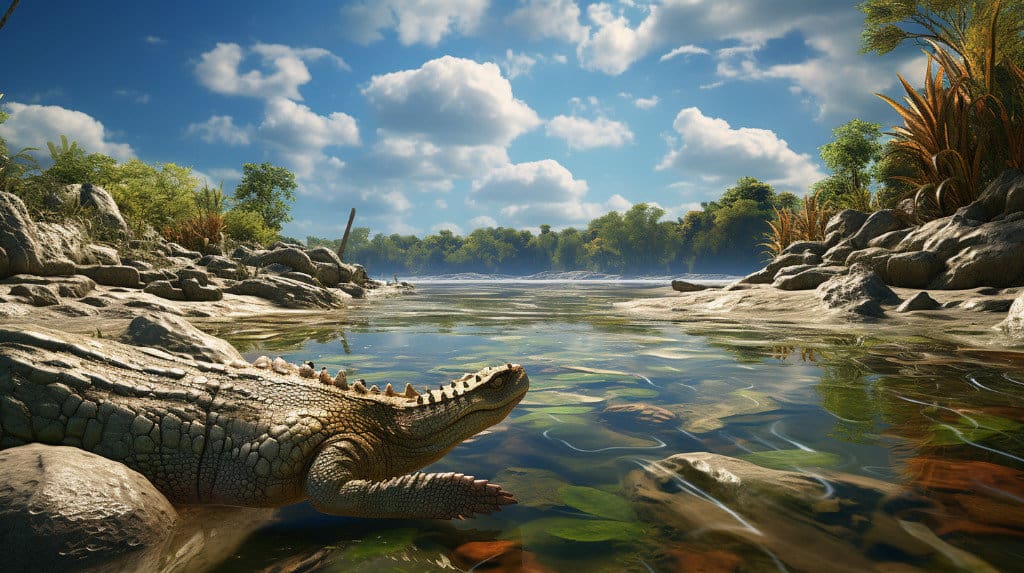Introduction:
When it comes to comparing the aggression levels of crocodiles and alligators, it’s a topic that often sparks curiosity. Both of these reptiles are known for their powerful jaws and predatory nature, but is one more aggressive than the other? In this article, we will explore the question: are crocodiles more aggressive than alligators?
Key Takeaways:
| Crocodiles | Alligators |
|---|---|
| Known for their aggressive behavior | Generally less aggressive than crocodiles |
| Tend to be more territorial | Can be territorial but less aggressive in nature |
| Display a wider range of aggressive behaviors | Exhibit fewer aggressive behaviors compared to crocodiles |
| Have a reputation for being more dangerous to humans | Considered less dangerous to humans compared to crocodiles |
Please note that the information provided in the table is based on general observations and may vary depending on individual circumstances and species.
Understanding the Basic Differences Between Crocodiles and Alligators

Physical Differences
When it comes to distinguishing between crocodiles and alligators, there are several physical differences that can help us tell them apart. Let’s take a closer look at these variations:
-
Snout Shape: One of the most noticeable differences is the shape of their snouts. Crocodiles have a V-shaped snout, while alligators have a U-shaped snout. This distinction is important as it affects their feeding habits and prey preferences. Crocodiles, with their slender snouts, are better adapted for catching fish, whereas alligators, with their broader snouts, are more suited for hunting larger prey like turtles and mammals.
-
Tooth Visibility: Another way to differentiate between the two is by examining their teeth. When an alligator’s mouth is closed, its upper teeth are not visible as they fit neatly into sockets in the lower jaw. On the other hand, when a crocodile’s mouth is closed, its fourth tooth on the lower jaw is exposed, giving it a toothy grin. This visible tooth is a characteristic feature of crocodiles.
-
Coloration: While both crocodiles and alligators have a similar coloration of dark green or brown, there is a slight difference in shade. Crocodiles tend to have a lighter olive color, while alligators have a darker, almost black color. This distinction in color can help in identifying the species from a distance.
-
Size: In terms of size, crocodiles generally grow larger than alligators. The average adult crocodile can reach lengths of 13 to 16 feet, whereas alligators usually measure around 10 to 15 feet. However, it’s important to note that size can vary among individuals and species.
Habitat Differences
Apart from their physical characteristics, crocodiles and alligators also differ in their habitat preferences. Here are some key distinctions:
-
Geographical Distribution: Crocodiles are found in tropical regions across the world, including Africa, Australia, Southeast Asia, and the Americas. Alligators, on the other hand, are primarily found in the United States and China. This difference in distribution is due to variations in climate and habitat suitability.
-
Freshwater vs. Brackish Water: Crocodiles are more adaptable to different environments and can be found in both freshwater and brackish water habitats. They are often seen in rivers, lakes, swamps, and even estuaries. Alligators, on the other hand, prefer freshwater habitats such as marshes, swamps, and slow-moving rivers. They are less tolerant of saltwater and are rarely found in brackish or marine environments.
-
Temperature Tolerance: Alligators are better adapted to colder temperatures compared to crocodiles. They have a higher tolerance for cooler climates and can survive in regions with colder winters. Crocodiles, on the other hand, thrive in warmer climates and are less tolerant of cold temperatures.
-
Nesting Habits: When it comes to nesting, crocodiles tend to build their nests in open areas, such as sandy riverbanks or beaches. Alligators, on the other hand, construct their nests in denser vegetation, such as marshes or swamps. This difference in nesting habits is influenced by their respective habitat preferences.
In conclusion, understanding the basic differences between crocodiles and alligators is essential for anyone interested in these fascinating reptiles. By examining their physical characteristics and habitat preferences, we can gain a deeper insight into their behavior and appreciate the unique traits of each species. So, whether you’re intrigued by crocodile behavior, alligator aggression, or simply want to compare the two, exploring the distinctions between these reptiles will surely enhance your knowledge of wildlife aggression and reptile behavior.
Aggression Levels in Crocodiles and Alligators: An Overview

Crocodiles and alligators are fascinating creatures known for their impressive size and powerful jaws. When it comes to aggression, these reptiles have earned a reputation for being formidable predators. Let’s take a closer look at the general behavior of crocodiles and alligators to understand their aggression levels.
General Behavior of Crocodiles
Crocodiles are known for their aggressive nature, especially when it comes to defending their territory or protecting their young. These reptiles are highly territorial and will fiercely defend their chosen area. They are also known to be opportunistic hunters, patiently waiting for the perfect moment to strike their prey. Crocodiles have a higher aggression level compared to alligators, making them more prone to aggressive encounters with humans or other animals.
Crocodile behavior studies have shown that they have a higher attack rate compared to alligators. This can be attributed to their aggressive temperament and their ability to quickly react to potential threats. It is important to exercise caution when encountering crocodiles in the wild, as their aggression can pose a significant danger.
General Behavior of Alligators
Alligators, on the other hand, are generally less aggressive compared to crocodiles. They are more tolerant of human presence and are less likely to initiate an attack unless provoked or threatened. Alligators are known to be ambush predators, patiently waiting for their prey to come within striking distance. They are opportunistic feeders and will consume a variety of prey, including fish, birds, and mammals.
Alligator aggression research has shown that they have a lower attack rate compared to crocodiles. While they may exhibit territorial behavior, they are generally less aggressive towards humans. However, it is important to remember that alligators are still wild animals and should be treated with caution and respect.
A Comparison between Crocodiles and Alligators
When comparing the aggression levels of crocodiles and alligators, it is evident that crocodiles tend to be more aggressive. This can be attributed to their territorial nature and their higher attack rate. Alligators, on the other hand, are generally less aggressive and more tolerant of human presence.
Here is a table summarizing the key differences in crocodile and alligator aggression:
| Aspect | Crocodiles | Alligators |
|---|---|---|
| Aggression Level | High | Low |
| Attack Rate | High | Low |
| Reaction to Threats | Aggressive | Tolerant |
| Tendency to Attack Humans | Higher | Lower |
It is important to note that while alligators may have a lower aggression level, they are still powerful predators and should be treated with caution. Both crocodiles and alligators are capable of inflicting serious harm if provoked or cornered.
In conclusion, crocodiles and alligators have different aggression levels, with crocodiles being more aggressive overall. Understanding their general behavior and respecting their space is crucial when encountering these fascinating reptiles in their natural habitats.
Why are Crocodiles More Aggressive than Alligators?
Crocodiles and alligators are both fascinating creatures, but have you ever wondered why crocodiles are generally more aggressive than alligators? Let’s explore some factors that contribute to this difference in temperament.
The Role of Habitat and Environment
One of the key factors that influences the aggression levels of crocodiles and alligators is their habitat and environment. Crocodiles are typically found in more diverse and challenging environments compared to alligators. They inhabit a wide range of habitats, including rivers, lakes, swamps, and even coastal areas. This exposure to different environments may contribute to their heightened aggression.
On the other hand, alligators tend to inhabit more stable and predictable environments, such as freshwater marshes and swamps. These environments provide them with a more consistent and abundant food supply, reducing the need for aggressive behavior. The differences in their habitats and the challenges they face play a significant role in shaping their behavior.
Influence of Hunting Patterns
Another factor that contributes to the difference in aggression between crocodiles and alligators is their hunting patterns. Crocodiles are known to be more active hunters and have a wider prey range compared to alligators. They are opportunistic predators and will often take on larger prey, such as zebras or wildebeests. This aggressive hunting behavior may be a result of their need to secure larger meals and survive in their diverse habitats.
In contrast, alligators have a more limited prey range and primarily feed on smaller animals like fish, turtles, and birds. Their hunting patterns are generally less aggressive and more focused on ambush tactics. This difference in hunting behavior may explain why alligators are generally less aggressive compared to crocodiles.
Impact of Mating Rituals
Mating rituals also play a role in the aggression levels of crocodiles and alligators. During the breeding season, male crocodiles become highly territorial and aggressive in order to secure mates and defend their nesting sites. This aggression is driven by the intense competition among males for reproductive success. Female crocodiles also exhibit protective behavior towards their nests, further adding to the overall aggression during the mating season.
In comparison, alligators have a less aggressive mating ritual. Male alligators establish territories but are generally less aggressive towards each other. They rely more on vocalizations and visual displays to attract mates, rather than engaging in physical confrontations. This difference in mating behavior contributes to the variation in aggression levels between crocodiles and alligators.
In conclusion, several factors contribute to the heightened aggression of crocodiles compared to alligators. The diverse habitats they inhabit, their hunting patterns, and the intensity of their mating rituals all play a role in shaping their behavior. Understanding these differences allows us to appreciate the unique characteristics of these remarkable reptiles.
Case Study: Comparing American Crocodiles and Alligators
American crocodiles and alligators are two fascinating reptiles that share many similarities, but also have distinct differences in their behavior and temperament. In this case study, we will delve into the aggression levels of these magnificent creatures and explore how they compare to each other.
Aggression Levels in American Crocodiles
Crocodiles are known for their aggressive nature and are often regarded as one of the most dangerous animals in the world. Understanding the aggression levels of American crocodiles is crucial for wildlife experts and researchers. Several studies have been conducted to analyze crocodile behavior and their propensity for aggression.
One notable study focused on the crocodile attack rate and the danger they pose to humans. It revealed that while American crocodiles can be aggressive, they generally exhibit a lower attack rate compared to their counterparts in other regions. This suggests that their aggression levels may vary depending on factors such as habitat and human interaction.
To further understand crocodile aggression, researchers have also studied their behavior in encounters with humans. These studies have provided valuable insights into the crocodile’s threat level and the potential danger they pose. By analyzing crocodile aggression studies, experts can develop strategies to minimize human-crocodile conflicts and ensure the safety of both species.
Aggression Levels in Alligators
Alligators, like crocodiles, are formidable creatures with a reputation for aggression. However, there are subtle differences in the aggression levels between the two species. Research on alligator aggression has shed light on their behavior and provided a basis for comparison with crocodiles.
Studies have shown that alligators exhibit varying levels of hostility depending on their environment and interactions with humans. While they are generally less aggressive than crocodiles, alligators can still pose a threat if provoked or if their territory is encroached upon. Understanding alligator aggression is crucial for wildlife management and ensuring the safety of both humans and alligators.
Comparing Crocodile and Alligator Aggression
When comparing the aggression levels of crocodiles and alligators, it is important to consider their distinct behaviors and temperaments. While both species can be aggressive, crocodiles tend to exhibit a higher level of aggression overall. This can be attributed to their larger size, territorial nature, and different environmental factors.
Crocodiles are known to be more opportunistic hunters and are more likely to engage in aggressive behavior towards humans. On the other hand, alligators are generally more tolerant of human presence and are less likely to initiate an attack unless provoked.
In summary, both American crocodiles and alligators possess aggression levels that are inherent to their species. While crocodiles tend to exhibit higher aggression levels overall, alligators can still be formidable if threatened. Understanding the behavior and aggression of these reptiles is crucial for wildlife management and ensuring the safety of both humans and these magnificent creatures.
| Crocodile Aggression | Alligator Aggression |
|---|---|
| Higher aggression levels | Lower aggression levels |
| Opportunistic hunters | Tolerant of human presence |
| More likely to engage in aggressive behavior towards humans | Less likely to initiate an attack unless provoked |
By studying and comparing the aggression levels of American crocodiles and alligators, researchers can gain valuable insights into reptile aggression and contribute to wildlife conservation efforts.
Are Saltwater Crocodiles More Dangerous than Alligators?
Understanding Saltwater Crocodiles
When it comes to discussing dangerous reptiles, saltwater crocodiles and alligators often come to mind. Both of these creatures have a reputation for being formidable predators, but are saltwater crocodiles more dangerous than alligators? Let’s delve into the behavior and aggression of these reptiles to find out.
Saltwater crocodiles, also known as estuarine crocodiles, are the largest living reptiles on Earth. They are found in the brackish and freshwater regions of Southeast Asia, Australia, and the Pacific Islands. These crocodiles are known for their aggressive nature and territorial behavior. They have a reputation for being highly dangerous due to their size, strength, and predatory instincts.
Crocodile behavior studies have shown that saltwater crocodiles are opportunistic hunters, capable of ambushing their prey with lightning-fast strikes. They have a powerful bite force that can crush bones and tear apart their victims. These crocodiles are known to attack and consume a wide range of animals, including fish, birds, mammals, and even other crocodiles.
Comparing Danger Levels
To compare the danger levels of saltwater crocodiles and alligators, let’s take a closer look at the aggression and attack statistics of these reptiles:
| Saltwater Crocodile | Alligator | |
|---|---|---|
| Average Length | Up to 23 feet | Up to 14 feet |
| Bite Force | 3,700 PSI | 2,125 PSI |
| Attack Rate | Higher | Lower |
| Fatalities | Higher | Lower |
Saltwater crocodiles have a larger average length and a more powerful bite force compared to alligators. This makes them more capable of inflicting severe injuries on their prey or potential threats. Additionally, studies have shown that saltwater crocodiles have a higher attack rate and are responsible for a greater number of fatalities compared to alligators.
Alligators, on the other hand, are generally less aggressive than saltwater crocodiles. They are found in freshwater habitats in the United States and China. Alligators primarily feed on fish, turtles, birds, and small mammals. While they are capable of defending themselves and can be dangerous if provoked, their aggression level is generally lower compared to saltwater crocodiles.
In terms of danger, saltwater crocodiles pose a higher threat level due to their larger size, more powerful bite, and higher attack rate. However, it is important to note that both saltwater crocodiles and alligators are wild animals and should be treated with caution and respect.
In conclusion, saltwater crocodiles are indeed more dangerous than alligators based on their aggressive behavior, attack statistics, and potential for causing fatalities. It is crucial to exercise caution and avoid close encounters with these reptiles in their natural habitats.
Why are Alligators Less Aggressive than Crocodiles?

The Role of Adaptation and Evolution
When it comes to the behavior of crocodiles and alligators, there are several factors that contribute to their differing levels of aggression. One of the key factors is the role of adaptation and evolution. Over millions of years, both crocodiles and alligators have evolved to survive in their respective habitats, but they have adapted in different ways.
Crocodile behavior is generally known to be more aggressive compared to alligators. This can be attributed to the differences in their evolutionary history. Crocodiles have been around for over 200 million years and have had to compete with other large predators in their environment. As a result, they have developed a more aggressive temperament as a survival strategy. On the other hand, alligators have a more recent evolutionary history, and their habitats have been less competitive. This has led to a less aggressive nature compared to crocodiles.
Influence of Human Interaction
Another factor that plays a role in the differing aggression levels between crocodiles and alligators is the influence of human interaction. Human activities have had a significant impact on the behavior of both species, but the effects are more pronounced in crocodiles.
Crocodiles have often been hunted for their valuable skin and have faced habitat destruction due to human activities. These factors have led to a decrease in their population and an increase in their aggression. With fewer resources available and increased competition, crocodiles have become more aggressive in their encounters with humans.
On the other hand, alligators have faced less hunting pressure and habitat destruction compared to crocodiles. This has allowed them to maintain a more balanced population and a less aggressive temperament. While alligators can still be dangerous and should be treated with caution, their encounters with humans are generally less aggressive compared to crocodiles.
In summary, the differing levels of aggression between crocodiles and alligators can be attributed to a combination of factors. The role of adaptation and evolution has shaped their behavior over millions of years, with crocodiles being more aggressive due to their longer evolutionary history and competitive habitats. Additionally, the influence of human interaction has further impacted crocodile behavior, making them more aggressive compared to alligators. Understanding these factors is crucial for managing encounters with these reptiles and ensuring human safety in their habitats.
Conclusion
In conclusion, when it comes to the question of whether crocodiles are more aggressive than alligators, it is important to consider various factors. While both crocodiles and alligators are formidable predators, it is generally believed that crocodiles tend to be more aggressive. This can be attributed to their larger size, stronger bite force, and territorial nature. However, it is important to note that individual behavior can vary among both species, and there are instances where alligators have displayed aggression. Ultimately, it is best to exercise caution and respect when encountering either of these fascinating reptiles in their natural habitats.
Frequently Asked Questions
Are saltwater crocodiles more dangerous than alligators?
Yes, saltwater crocodiles are generally considered more dangerous than alligators. They are known for their aggressive nature and have a higher attack rate compared to alligators.
Why are crocodiles more aggressive than alligators?
Crocodiles are more aggressive than alligators due to their behavioral differences. Crocodiles tend to be more territorial, show less fear of humans, and are more likely to view humans as a food source, making them more dangerous.
Why are crocodiles more dangerous than alligators?
Crocodiles are more dangerous than alligators due to their higher levels of aggression, larger size, and more predatory behavior. Additionally, crocodiles have a higher attack rate than alligators, making encounters with them potentially more dangerous.
Are crocodiles more dangerous than alligators?
Yes, crocodiles are generally considered more dangerous than alligators. This is based on their aggressive behavior, larger size, and higher attack statistics.
Why are alligators less aggressive than crocodiles?
Alligators tend to be less aggressive than crocodiles because they are more cautious and less territorial. They are more likely to flee from humans rather than attack unless they feel threatened or provoked.
Why are crocodiles so much more aggressive than alligators?
Crocodiles are more aggressive than alligators due to their territorial behavior and less fear of humans. Their high aggression levels are also influenced by their larger size and predatory nature.
Are American crocodiles more aggressive than alligators?
Yes, American crocodiles are more aggressive than alligators. Despite their similar habitats, American crocodiles exhibit higher levels of aggression and a higher danger level compared to alligators.
Are crocodiles more vicious than alligators?
Yes, crocodiles are generally considered more vicious than alligators. This is mainly due to their behavioral differences, with crocodiles being more aggressive, territorial, and less fearful of humans.
Are alligators less aggressive than crocodiles?
Yes, alligators are generally less aggressive than crocodiles. They are more likely to avoid human encounters and only attack when they feel threatened or provoked.
How are crocodiles more aggressive than alligators?
Crocodiles are more aggressive than alligators due to their higher levels of territorial behavior, less fear of humans, and a stronger predatory instinct. This makes them more likely to attack humans, leading to a higher danger level.




